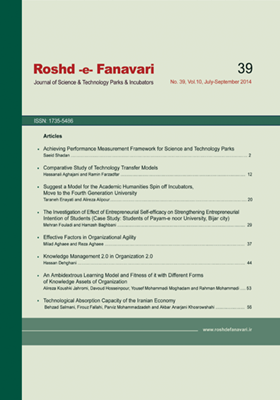Suggest a Model for the Academic Humanities Spin off Incubators, Move to the Fourth Generation University
Subject Areas : مديريت تکنولوژيTaraneh Enayati 1 , Alireza Aulipour 2 *
1 -
2 -
Keywords: Humanities Spin off Enterprises Software Technology Fourth Generation Universities,
Abstract :
Experts believe the academic humanities is the platform of all sciences in any countries. Therefore, the academic humanities should provide development platforms before experiential and technical sciences. The movement from training-based universities to entrepreneur-based universities was based on turning theory to practice and knowledge commercialization, which led to the creation of incubators and university spin off enterprises. But something which was neglected was the status of the humanities in the incubators and university spin off enterprises. This paper is a qualitative study which the researchers studied the records, information on the database and interviewed with the experts from the Science and Technology Parks and Incubators. Open and in-depth interviewing method was applied to describe challenges and problems for knowledge commercialization in the field of the academic humanities. In the end, The researchers suggest a model for humanities’ spin off enterprises by considering software technology, in order to move in the post post-modern world and localization of humanities and move towards the creation of a fourth generation university.
1. حبیبی رضائی، مهران، سیاه منصوری یاسر. "تحقق دانشگاههاي نسل سوم از رهگذر توسعه مراكز رشد دانشگاهي". نشریه نشاء علم، سال سوم ، شماره اول، دی ماه 1391.#
2. آراسته، حميدرضا. "تغيير راهبردي در دانشگاهها و مراكز آموزش عالي". تهران، انتشارات دانشگاه امام حسين(ع)، 1382.#
3. فرامرزپور، محمد. "بررسي گزيدهاي از عوامل چالش آفرين براي مراكز رشد و پاركهاي علم و فناوري". ماهنامه زیست فناوری، شماره¬13¬، خردادماه¬ 1389.#
4. سلجوقی، "مجموعه قوانين مراكز رشد واحدهاي فناوري، پاركهاي علم و فناوري، شهركهاي علمي و تحقيقاتي و شهركهاي صنعتي و صنايع كوچك"، 1386.#
5. شاهوردیانی، شادی. "بررسي تأثير عوامل محيطي بر ايجاد و توسعه مراكز رشد دانشگاهها: رهيافتي نو بر دانشگاه كارآفرين و ارتباط بين صنعت و دانشگاه"، نشريه صنعت و دانشگاه، سال سوم، شماره 7 و 8، بهار و تابستان ¬-1389.#
6. قانعی راد، محمد امین. "اهمیت اشتغال برای فارغالتحصیلان علوم انسانی"، اولین همایش ملی علوم انسانی و چالش اشتغال، دانشکده ادبیات و علوم انسانی دانشگاه تهران، 1387.#
7. باقری، کامران." بررسی حلقههای مفقوده ارتباط دولت، دانشگاه و صنعت در ایران بر اساس رویکرد سیستم نوآوری". مجموعه مقالات هفتمین کنگره دولت، دانشگاه و صنعت،100-87 ، 1382. #
8. شفيعي، مسعود." ارتباط صنعت و دانشگاه- آيندهاي تابناك، پيشينهاي تاريك". انتشارات دانشگاه صنعتي اميركبير، 1384.#
9. وزارت علوم، تحقیقات و فناوری، دفتر برنامهریزی و سیاست گذاری فناوری، راهنمای تجاریسازی دستاوردهای پژوهشی در دانشگاهها و موسسات پژوهشی و فناوری، 1388.#
10. ودادي، سميه و ميرزاپور، پوپك. "نقش دانشگاه آزاد اسلامي در توسعه كارآفريني". مجموعه مقالات همايش عملكرد ربع قرن دانشگاه آزاد اسلامي واحد كرمانشاه، 1386.#
11. محمودي، محمود، سادات مقتدايي، زهره." تكوين و توسعه دانشگاه كارآفرين، بهترين و اثر بخشترين روش تعامل دانشگاه و صنعت". مجموعه مقالات سومين كنگره بين المللي و دهمين، كنگره سراسري دولت، دانشگاه و صنعت، 1386.#
12. قبادی، حسینعلی. "پژوهش کاربردی در علوم انسانی، دو ماهنمامه پژوهش کاربردی در علوم انسانی"، شماره 25، 1390.#
13. مکی نیری، پریسا "افزایش شناخت؛ راهی برای کاربردی کردن علوم انسانی" دو ماهنمامه پژوهش کاربردی در علوم انسانی، شماره 26. 1391.#
14. عبداللهیان، حمید. "کاربردی کردن علوم انسانی در ایران"، دو ماهنامه پژوهش کاربردی در علوم انسانی. شماره 26، 1391.#
15. زاهد، سید سعید. "کاربرد علوم انسانی"، دو ماهنامه پژوهش کاربردی در علوم انسانی، شماره 25. 1390.#
16. مصباح یزدی، محمدتقی. کنگره بینالمللی علوم انسانی در تاریخ طرحی جامع برای اسلامی سازی علوم، 1391.#
17. پایا، علی. "آینده علوم انسانی در ایران"، فصلنامه حوزه و دانشگاه 12(47): 1-36، 1385.#
18. Knopp, Linda. State of the business Incubation Industry. Athens, Ohio: National Business Incbation Association, 2007.#
19. Dietrich, F., Fiedler, H., Nagy, P. The concept of business incubators and innovation centers, ICECE Focus, Vol.1, Berlin, 1996.#
20. Wadsworth, J. " Global R & D Funding Forecast: R&D Spending Growth Continues while Globalization Accelerates", Battele and R&D magazine (www.rdmag.com), 2012.#
21. Mansfield, E., 1995, _Academic Research Underlying Industrial Innovations: Source, Characteristics and Financing,_ The eview of Economics and Statistics 77, 55-65.#
22. Benneworth, P. S. & Charles, D. R. (2004) "Overcoming learning uncertainties in the innovation process: the contribution of clustering to firms' innovation performance" in R. Oakey, W. During & S. Kauser (eds.) New technology based firms in the new millennium Vol 3, London: Pergamon.#
23. Lockett, A, Wrigt, M., and Franklin, S., (2003) "Technology Transfer and Universities' Spinout Strategy', Small Business Economics 20(2) pp. 185-201.#
24. Urszula WNUK, Adam MAZURKIEWICZ.(2012),”Institute for Sustainable Technologies – National Research Institute in Radom Poland”, PROBLEMY EKSPLOATACJI,2012.#
25. Kristensen, P.H. , Spectator communities and Entrepreneurial Districts. Entrepreneurship and Regional Development, 1994.#
26. JIN, Zhouying. Global Technological Change; From Hard Technology to Soft Technology, Translated by Kelvin W. Willoughby, Bristol, UK, 2005 (Chapter 3).#
27. Olaf Helmer, Bernice Brown, Theodore Gordon .(1996). Social Technology, Basic books Publisher, New York.#
28. Coe, D., Helpman, E. & A.W. Hoffmaister (2009), "International R&D Spillovers and Institutions", European Economic Rview,Vol. 53, No. 7,PP.423-796.#

